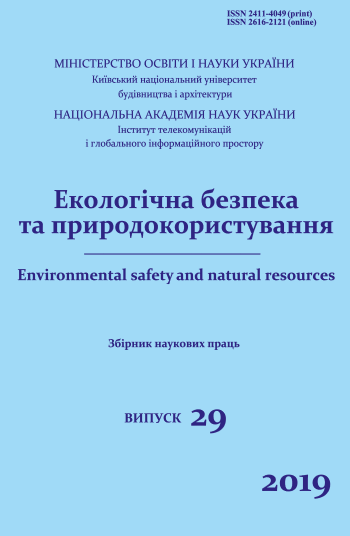Сonceptualization of latent ecosystem services
DOI:
https://doi.org/10.32347/2411-4049.2019.1.54-64Keywords:
ecosystem services, recycling, secondary raw materialsAbstract
The technology of waste sorting and recycling can build a profitable business, provide a return to the turnover of secondary resources, reduce the amount of landfills, and simplify the storage of garbage, which makes it possible to create a resource-efficient, competitive economy. By turning waste into raw materials and materials, recycling allows you to save on natural resources, create new jobs and thus reduce the unemployment rate in the country, and reproduce competitive production. The sector of recycling of secondary resources creates a social effect – contributes to the creation of new jobs. The recycling generates demand for low, medium and highly skilled labor.References
Boronos, V. М., & Mamchuk, І. V. (2007). Environmental efficiency of industrial waste use. Visnyk SumDu. Economics Series, (2), 5-17 (in Ukrainian).
Vorachek, H. (2002). About the state of the "theory of marketing services". Problems of management theory and practice, (1), 99-103 (in Russian).
Ustenko, O. A., & Yuri, S. I. (2006). Economic Encyclopedic Dictionary (Vol. 2) (S. V. Mocherny, Ed.). Lviv: World (in Ukrainian).
Zagvoyska, L. D. (2013). Conceptualization of ecosystem services in modern ecological-economic discourse. Scientific works of the Forestry Academy of Sciences of Ukraine: collection of scientific works, (11), 178-185 (in Ukrainian).
Zagvoiska, L. (2005). Priority directions of scientific researches of ecological economy. Scientific Bulletin of NLTU of Ukraine, (15.6), 136-143 (in Ukrainian).
Zagvoiska, L. D. (2011). Philosophical and Economic Discourse of the Problem "Man-Nature". In J. V. Hlobystov (Ed.), Sustainable development and ecological safety: Theory, methodology, practice (pp. 12-41). Simferopol: VD "ARIAL" (in Ukrainian).
Kotler, F. (1996). Fundamentals of Marketing. Moscow: Rosinter (in Russian).
Kulish, K. A. (2016). Socio-economic effects of recycling in EU countries. Global and National Problems of Economy. Retrieved from http://global-national.in.ua/archive/9-2016/09.pdf (in Ukrainian).
Morozova, T. V. (2018). Zero waste - the fundamental principle of garbology. National Forum "Waste Management in Ukraine: Legislation, Economics, Technology" (pp. 148-150) (in Ukrainian).
Ostafiychuk, Y. V. (n.d.). Issues of actualization of scientific principles of the sphere of services development. Electronic Scientific Special Edition "Effective Economy". Retrieved from http: //www.economy. nayka.com.ua/index.php?operation=1&ides=851 (in Ukrainian).
Pavlyuk, N. Yu., & Segal, O. I. (2018). Energy utilization of solid waste in accordance with the national waste management strategy in Ukraine. National Forum "Waste Management in Ukraine: Legislation, Economics, Technologies" (pp. 9-10) (in Ukrainian).
Rajzberg, B. A., Lozovsky, L. Sh., & Starodubtseva, E. B. (2007). Contemporary Economic Dictionary. Moscow: INFRA-M (in Russian).
Rubanets, O. M. (2006). Paradigmatic Changes in Post-Classical Science. Multiversum. Philosophical Almanac, (53). Retrieved from http://www/filisof.com.ua/Jornel/M_53/Rubanez.htm (in Ukrainian).
Tarasevich, V. (2004). Post-classical science and economic theory. Economy of Ukraine, (20), 59-65 (in Ukrainian).
Timochko, T. V. (2018). Problems of waste management in Ukraine can be solved! National Forum "Waste Management in Ukraine: Legislation, Economics, Technology" (pp. 7-8) (in Ukrainian).
Shсhaslyva, L. A., Pashkov, A. P., & Sprinskaya, G. M. (2018). The world's leading ecological and economic experience of utilization of solid household wastes. National Forum "Waste Management in Ukraine: Legislation, Economics, Technology", (pp. 15-17) (in Ukrainian).
Europäische kommission Vorschlag für eine richtlinie des europäischen parlaments und des rates zur Änderung der Richtlinie 2000/25/EG in Bezug auf die Anwendung von Emissionsstufen bei Schmalspurzugmaschinen. (n.d.). Retrieved from http://eur-lex.europa.eu/LexUriServ/LexUriServ.do?uri=COM:2011:0001:FIN:DE:PDF (in Deutsch).
EEA Report. Earnings, jobs and innovation: The role of recycling in a green economy. (n.d.). Retrieved from http://www.eea.europa.eu/publications/earnings-jobsand-innovation-the.
European Commission. (2015). Retrieved from http://ec.europa.eu/environment/waste/pdf/final_ report_10042012.pdf2015.
European environment agency. (2012). European Environment State and outlook: Material resources and waste. Copenhagen: Publication office.
Daily, G. C. (Ed.). (1997). Nature’s Services: Societal Dependence on Natural Ecosystems. Washington, DC: Island Press.
Haines-Young, R., & Potschin, M. (2012). Common international classification of ecosystem services (CICES, Version 4.1). EEA.
Odum, E. P. (1971). Fundamentals of Ecology (3rd ed.). NY: Saunders.
Swedish Institute. (2015). PHYTECO project regenerates glassworks site. Retrieved from https://eng.si.se/phyteco-project-regenerates-glassworks-site/
Kumar, P. (Ed.). (2010). TEEB (The Economics of Ecosystems and Biodiversity). Ecological and Economic Foundations. London and Washington: Earthscan.
Downloads
Published
How to Cite
Issue
Section
License
Copyright (c) 2019 Tetiana V. Morozova, Vitalina V. Lukianova, Yevheniia S. Anpilova

This work is licensed under a Creative Commons Attribution 4.0 International License.
The journal «Environmental safety and natural resources» works under Creative Commons Attribution 4.0 International (CC BY 4.0).
The licensing policy is compatible with the overwhelming majority of open access and archiving policies.

